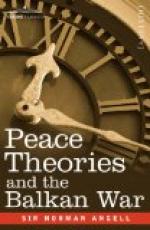But if on the other hand they are guided more by the Pacifist principle, if they believe that co-operation between States is better than conflict between them, if they believe that the common interest of all in good Government is greater than the special interest of any one in conquest, that the understanding of human relationships, the capacity for the organisation of society are the means by which men progress, and not the imposition of force by one man or group upon another, why, they will have taken the pathway to better civilisation. But then they will have disregarded Lord Roberts’ advice.
And this distinction between the two systems, far from being a matter of abstract theory of metaphysics or logic chopping, is just the difference which distinguishes the Briton from the Turk, which distinguishes Britain from Turkey. The Turk has just as much physical vigour as the Briton, is just as virile, manly and military. The Turk has the same raw materials of Nature, soil and water. There is no difference in the capacity for the exercise of physical force—or if there is, the difference is in favour of the Turk. The real difference is a difference of ideas, of mind and outlook on the part of the individuals composing the respective societies; the Turk has one general conception of human society and the code and principles upon which it is founded, mainly a militarist one; and the Englishman has another, mainly a Pacifist one. And whether the European society as a whole is to drift towards the Turkish ideal or towards the English ideal will depend upon whether it is animated mainly by the Pacifist or mainly by the Bellicist doctrine; if the former, it will stagger blindly like the Turk along the path to barbarism; if the latter, it will take a better road.
[Footnote 1: “Turkey in Europe,” pp. 88-9 and 91-2.
It is significant, by the way, that the “born soldier” has now been crushed by a non-military race whom he has always despised as having no military tradition. Capt. F.W. von Herbert ("Bye Paths in the Balkans”) wrote (some years before the present war): “The Bulgars as Christian subjects of Turkey exempt from military service, have tilled the ground under stagnant and enfeebling peace conditions, and the profession of arms is new to them.”
“Stagnant and enfeebling peace conditions” is, in view of subsequent events distinctly good.]
[Footnote 2: I dislike to weary the reader with such damnable iteration, but when a Cabinet Minister is unable in this discussion to distinguish between the folly of a thing and its possibility, one must make the fundamental point clear.]
CHAPTER III.
ECONOMICS AND THE BALKAN WAR.
The “economic system” of the Turk—The Turkish “Trade of Conquest” as a cause of this war—Racial and Religious hatred of primitive societies—Industrialism as a solvent—Its operation in Europe—Balkans geographically remote from main drift of European economic development—The false economies of the Powers as a cause of their jealousies and quarrels—This has prevented settlement—What is the “economic motive"?—Impossible to separate moral and material—Nationality and the War System.




